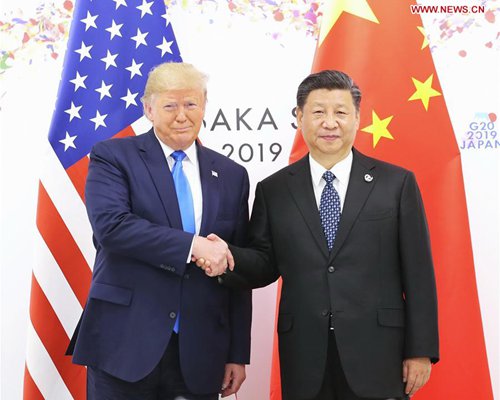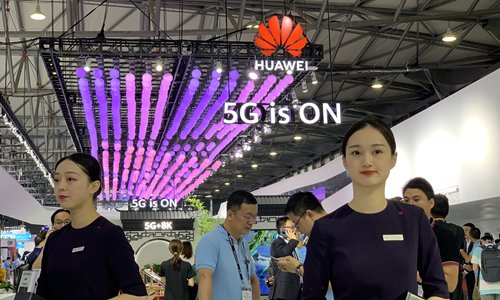HOME >> CHINA
New China-US consensus boosts markets
By Chen Qingqing Source:Global Times Published: 2019/7/2 0:38:39
Two state leaders set tone for improving bilateral relations

Chinese President Xi Jinping meets with U.S. President Donald Trump in Osaka, Japan, June 29, 2019. Photo: Xinhua
China and the US will soon resume negotiations after the two sides agreed to a trade truce at a bilateral meeting on the sidelines of the G20 summit in Japan, sending positive signals and prompting global markets on Monday, showing that sound and sustainable bilateral relations are widely anticipated and welcomed by the global community, official and analysts said.
After US President Donald Trump pledged not to add more tariffs on Chinese products and claimed that the trade talks between the world's two largest economies are now back on track, major markets surged on the first trading day after the summit. Asia stocks rallied on Monday as US futures spiked. Both offshore and onshore, the Chinese yuan surged against the US dollar and oil futures also gained.
The Shanghai stock exchange gained 2.22 percent and closed at 3,044.9, reaching a new high since May while the Shenzhen index soared nearly 4 percent to 9530.5. Asian and European markets were boosted by the positive stance following the Xi-Trump meeting as Japan's Nikkei climbed 2.13 percent and major European indexes also jumped, led by technology stocks, media reports said.
US stocks opened higher on Monday following the easing of trade tensions between China and the US at the G20. The NASDAQ jumped 1.8 percent with chipmakers including Micron and Skyworks Solutions - two Huawei suppliers - leading the surge.
"Although the agreement will likely partially relieve recent negative sentiment in the financial markets and support near-term growth, it stops short of removing existing tariffs," Michael Taylor, managing director and chief credit officer for Moody's Asia Pacific, said in a statement sent to the Global Times.
A tit-for-tat tariff war goes against the will of not only Chinese businesses but also US industry representatives, which also dampens the outlook for global economic growth. Hundreds of American companies have already sent messages to the Trump administration protesting tariff hikes on Chinese imports.
Top leaders of China and the US reached an important consensus at the G20 summit to push forward bilateral relations based on cooperation, coordination and stability, and exchanged views on fundamental issues, Chinese Foreign Ministry spokesperson Geng Shuang said at a routine press conference on Monday. "Resuming trade talks is in the interests of both sides, as the trade war will not be helpful at all, which the US is clear about," he said.
Industry analysts said lessened tensions between the world's two largest economies will inject new growth momentum in a wide range of industries, including shipping, energy and infrastructure, and American business representatives praised the US President's decision to restart trade talks with China.
The US Chamber of Commerce said it is encouraged by the resumption of trade negotiations, as new tariffs would damage businesses, workers, consumers and the global economy, CNBC reported.
"The consensus is a new starting point for China-US relations, as the two sides have taken fundamental issues into account and have established a basis for further development. It is significant for global markets and the people of both countries, which is a relief," Wei Jianguo, former vice commerce minister, told the Global Times.

Two employees welcome attendees to MWC19 Shanghai at the entrance to the Huawei exhibition hall. Photo: Chen Qingqing/GT
Clear direction
Despite the positive tone cheered by the global community, analysts also predicted that China and US negotiators still face a bumpy road ahead in future trade negotiations and they need time to talk through divergences on issues such as WTO reform and government subsidies.
Furthermore, differing views from within the US political system are likely to make those talks even more challenging.
Trump's intention to lift the ban on Huawei drew bipartisan criticism. US Senator Minority Leader Chuck Schumer said removing the ban on Huawei would dramatically undercut Washington's ability to change China's unfair trade practices, according to media reports.
Huawei executives have reiterated that the company is fully prepared for possible future capricious US demands. Some don't believe the mercy the US side showed as the company continues to expand over the long term. Likewise, China has been hoping for the best while planning for the worst.
"A yearlong trade war is weighing on the US economy, and Washington's moves have hurt the existing rules-based order and its credibility, which has given us more chances to win," said Mei Xinyu, a veteran analyst close to the Ministry of Commerce.
The consensus reached by the two sides at the G20 points to the further development of bilateral relations and has received a positive response from China, the US, and the global community, and this shows that sound bilateral relations are widely expected, said Geng.
A number of Asia specialists including former US diplomats and military officers warned that Washington's approach of treating China as an enemy could hurt the interests of the US and the global economy, Reuters reported, citing an open letter the experts drafted.
Attempts to decouple China from the global economy will also damage America's international role and reputation and undermine the economic interests of all nations, the letter said.
"It might be a tough road ahead, but we should remain optimistic as top leaders have already set the basic tone, and two countries will move forward," Wei said.
Posted in: POLITICS